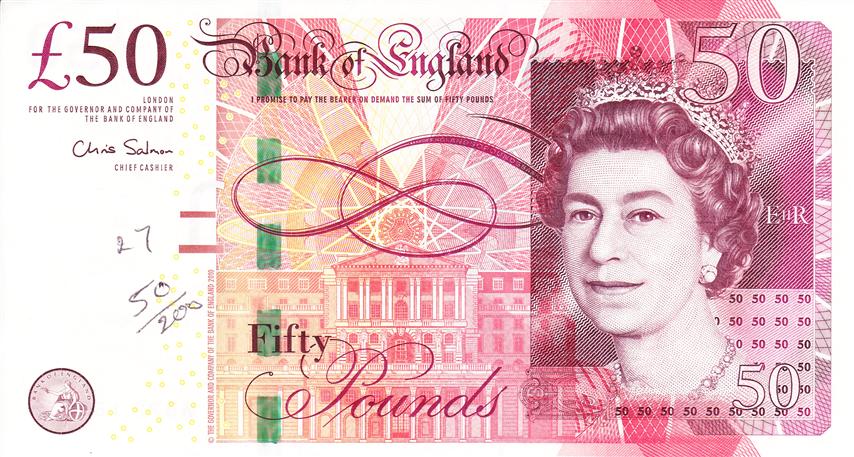Now here’s an oddity which I found out by chance the other day …
Bank of England sterling banknotes are the only paper money which is legal tender in England and Wales. No banknotes are legal tender in Scotland or Northern Ireland! (Bank of England coinage is legal tender throughout the UK.)

The following quotes come from the Wikipedia article on Banknotes of the Pound Sterling which, for those in doubt, is well referenced.
The Bank of England [acts] as a central bank in that it has a monopoly on issuing banknotes in England and Wales, and regulates the issues of banks in Scotland and Northern Ireland …
… some of the monopoly provisions of the Bank Charter Act [of 1844] only applied to England and Wales. The Bank Notes (Scotland) Act was passed [in 1845], and to this day, three retail banks retain the right to issue their own sterling banknotes in Scotland, and four in Northern Ireland …
English banknotes … The majority of sterling notes are printed by the Bank of England. These are legal tender in England and Wales, and are always accepted by traders throughout the UK …
Scottish banknotes … are the recognised currency in Scotland, but are not legal tender. They are always accepted by traders in Scotland, and are usually accepted in other parts of the United Kingdom. However, some outside Scotland are unfamiliar with the notes and they are sometimes refused. Institutions such as clearing banks, building societies and the Post Office will readily accept Scottish bank notes.
The situation in Northern Ireland is exactly as in Scotland except that Northern Ireland banknotes are seldom seen outside the province.
And here now is the interesting part …
The concept of “legal tender” is a narrow technical definition that refers to the settlement of debt, and it has little practical meaning in everyday transactions such as buying goods in shops (but does apply, for example, to the settling of a restaurant bill, where the food has been eaten prior to demand for payment and so a debt exists). Essentially, any two parties can agree to any item of value as a medium for exchange when making a purchase (in that sense, all money is ultimately an extended form of barter). If a debt exists that is legally enforceable and the debtor party offers to pay with some item that is not “legal tender,” the creditor may refuse such payment and declare that the debtor is in default of payment; if the debtor offers payment in legal tender, the creditor is required to accept it or else the creditor is in breach of contract. Thus, if in England party A owes party B 1,000 pounds sterling and offers to pay in Northern Ireland banknotes, party B may refuse and sue party A for non-payment; if party A provides Bank of England notes, party B must acknowledge the debt as legally paid even if party B would prefer some other form of payment.
Banknotes do not have to be classed as legal tender to be acceptable for trade; millions of retail transactions are carried out each day in the UK using cheques, bitcoin, or debit or credit cards, none of which is a payment using legal tender … Acceptability as a means of payment is essentially a matter for agreement between the parties involved.
Bank of England notes are the only banknotes that are legal tender in England and Wales. Scottish and Northern Ireland banknotes are not legal tender anywhere … The fact that these banknotes are not legal tender in the UK does not however mean that they are illegal under English law, and creditors and traders may accept them if they so choose …
In Scotland and Northern Ireland, no banknotes, not even ones issued in those countries, are legal tender. They have a similar legal standing to cheques or debit cards, in that their acceptability as a means of payment is essentially a matter for agreement between the parties involved, although Scots law requires any reasonable offer for settlement of a debt to be accepted.
Until 1988, the Bank of England issued one pound notes, and these notes did have legal tender status in Scotland and Northern Ireland while they existed. The Currency and Bank Notes Act 1954 defined Bank of England notes of less than £5 in value as legal tender in Scotland. Since the English £1 note was removed from circulation in 1988, this leaves a legal curiosity in Scots law whereby there is no paper legal tender in Scotland.
And here’s a further curiosity …
Bank notes are no longer redeemable in gold and the Bank of England will only redeem sterling banknotes for more sterling banknotes or coins. The contemporary sterling is a fiat currency which is backed only by securities; in essence IOUs from the Treasury … Some economists term this “currency by trust”, as sterling relies on the faith of the user rather than any physical specie.
In other words all money is worthless; it is all either physical tokens (banknotes, coins) or electronic bits in a computer system and it is all government IOUs. But it was the definition of “legal tender” and the lack of banknotes as legal tender in Scotland and Northern Ireland which piqued my interest.
